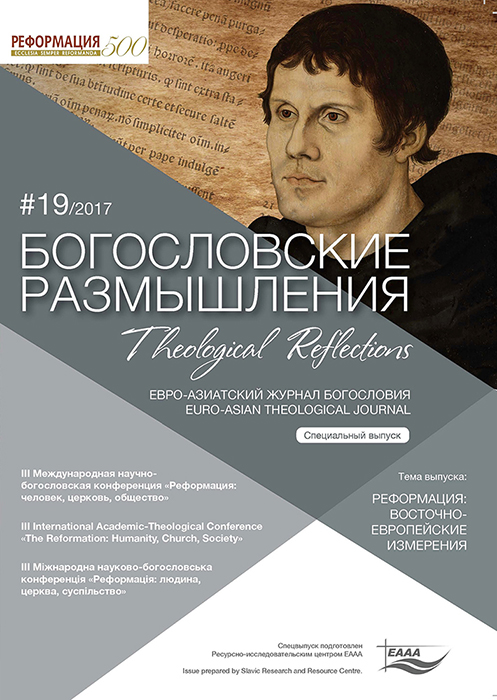Protestantism and the Emergence of Human Rights
DOI:
https://doi.org/10.29357/issn.2521-179X.2017.19.71Keywords:
Protestantism, Enlightenment, Human rights, Religious tolerance, Plural society.Abstract
The idea of human rights is widely accepted as a foundation of legislation and political action. It is the cornerstone of liberal democracies, the ideal held out against oppression and injustice all over the world. At the same time, it arouses debate, and criticism from all parts. Different groups fight for different causes appealing to the same principle of human rights. For all their disagreement, they could perhaps agree on one thing, that is the origin of human rights. But even then, there is disagreement. The commonly held view that human rights are the fruit of the European and American Enlightenment in the 18th century, is now being questioned. In this article, we shall see that Protestantism has played a crucial role, especially one branch of Protestantism in the English-speaking world, the Baptist movement in the early 17th century. Our interest is not only to set the historical record straight, but also to see how the particular origins of human rights are relevant for the development of this principle in today’s societies.
References
- REFERENCES
- AMESBURY, Richard and George Newlands. Faith and Human Rights: Christianity and the Global Struggle for Human Dignity. Minneapolis: Fortress Press, 2008.
- CALVIN, Jean. Déclaration pour maintenir la vraie foi. Genéve, 1554.
- CASTELLION, Sébastien. Contre le libelle de Calvin aprés la mort de Michel Servet. Written in 1554. First published in 1612 in the Netherlands. Current edition: Geneva: Éditions Zoé, 1998.
- CASTELLION, Sébastien, sous le pseudonyme de Basile MONTFORT. Traité des Hérétiques, Geneva, 1554, par. 8.
- COSTAIN, Pam. ‘Moving the Agenda Forward.’ Connection to the Americas 14/8 (October 1997).
- GUILLEBAUD, JeanClaude. La refondation du monde. Paris : Seuil, 1999.
- HELWYS, Thomas. A Short Declaration of the Mystery of Iniquity (1611/ 1612), edited by Richard Groves, Macon, GA: Mercer University Press, 1998.
- LITTLE, David. Essays on Religion and Human Rights, Cambridge: Cambridge University Press, 2015.
- LOCHAK, Daniéle. Les droits de l’homme. Paris: La Décourverte, 2002.
- MACINTYRE, Alisdair. A Short History of Ethics: A History of Moral Philosophy from the Homeric Age to the Twentieth Century, Notre Dame, Indiana: University of Notre Dame Press, 1966, edition 1998.
- MOYN, Samuel. The Last Utopia: Human Rights in History. Cambridge: Belknap Press of Harvard University Press, 2010.
- OVERTON, Richard. An Arrow Against All Tyrants and Tyranny, Shot from the Prison at Newgate into the Prerogative Bowels of the Arbitrary House of Lords and All Other Usurpers and Tyrants Whatsoever… ((the first quarter of the complete title), published in London, 1642!
- OVERTON, Richard. Man’s Mortalitie, London, 1644.
- PERRY, Michael J. The Idea of Human Rights: Four Inquiries. New York: Oxford University Press, 2001.
- SHORTALL, Michal. Human rights and Moral Reasoning: A comparative Investigation by Way of Three Theorists and Their Respective Traditions of Enquiry: John Finnis, Ronald Dworkin and Jürgen Habermas. Rome: Gregorian Biblical Book Shop, 2009.
- SIEDENTOP, Larry. Inventing the Individual. The Origins of Western Liberalism. London: Allen Lane, 2014; Penguin Books, 2015.
- STAMOS, David N. Myth of Universal Human Rights: Its Origin, History, and Explanation, Along with a More Humane Way. Boulder, Colo.: Paradigm Publishers, 2013.
- STASSEN, Glen Harold. A Thicker Jesus: Incarnational Discipleship in a Secular Age. Louisville, Ky.: Westminster John Knox Press, 2012.
- STASSEN, Glenn Harold. Just Peacemaking: Transforming Initiatives for Justice and Peace. Louisville, Ky.: Westminster John Knox Press, 1992.
- TIERNEY, Brian. The Idea of Natural Rights, Studies on Natural Rights, Natural Law and Church Law, 11501625. Grand Rapids, Michigan/Cambridge UK: Eerdmans, 1997.
- TWISS, Summer, Marian Simion, Rodney Petersen (ed), Religion and Public Policy: Human Rights, Conflict, and Ethics. Cambridge: Cambridge University Press, 2015.
- WHITT, Jason D. ‘The Baptist Contribution to Liberty’. Freedom: Journal of the Center for Christian Ethics, Baylor University (2011): 3643.
- WILLIAMS, Roger. The Bloody Tenent of Persecution. Providence, 1644.
- WILLIAMS, Roger. The Complete Writings of Roger Williams. New York: Russell & Russell Inc. 1963.
- WITTE, John. ‘Roots and routes of rights.’ Article posted on http://blogs.ssrc.org/tif/2015/07/01/rootsandroutesofrights/
Downloads
Published
How to Cite
Issue
Section
License
Copyright (c) 2020 Evert Wilhelm Van de Poll

This work is licensed under a Creative Commons Attribution-NonCommercial 4.0 International License.
All articles published in the Journal are distributed under a Creative Commons Attribution-NonCommercial 4.0 International License
By submitting an article for publication in Theological Reflections: Eastern European Journal of Theology the author grants the editors the right to publish the article and distribute it in electronic and print form.
The author reserves all copyrights and the right to use the materials of the article in whole or in part for educational purposes, to write his own dissertations, to prepare abstracts, conference reports, oral presentations, etc., as well as post electronic copies of articles (including the final electronic version downloaded from the journal’s official website) on non-commercial web-resources without the consent of the editorial board and founders.



